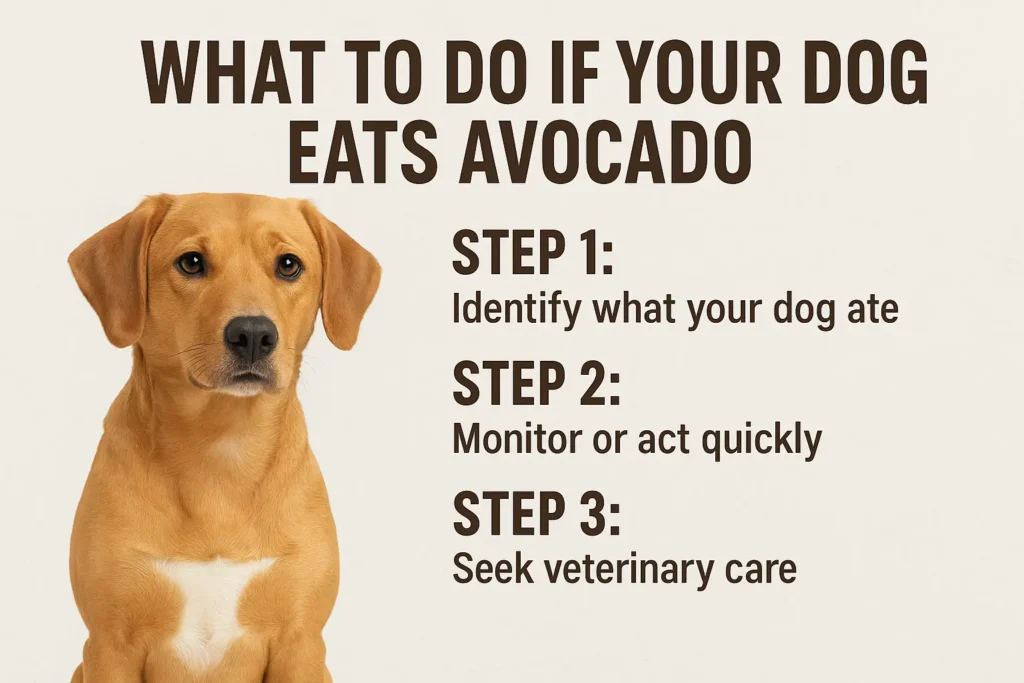Can Dogs Eat Avocado? Safe Feeding Guide

Introduction
Can dogs eat avocado? This is a common question many pet owners ask when they’re curious about sharing this popular fruit with their furry friends. While avocados are packed with nutrients for humans, they may pose certain health risks to dogs if not served properly. In this guide, we’ll explore whether avocados are safe for dogs, the potential dangers, and how to keep your pup healthy while enjoying a balanced diet.
Quick Answer: Can Dogs Eat Avocado?
In short, dogs can eat the flesh of ripe avocados in minimal amounts, but many risks exist. The pit, skin, and leaves of the avocado contain a substance called persin, which can upset your dog’s stomach and, in some cases, lead to more severe health problems. Moreover, the pit is a serious choking hazard that can block the intestines.
According to the AKC (American Kennel Club), small portions of avocado flesh may not harm most dogs. However, the potential dangers often outweigh the possible benefits.
Why the Avocado Debate Exists
The avocado debate exists because the fruit contains both nutritional benefits and hidden dangers. On the one hand, avocado flesh is packed with healthy fats, fiber, and vitamins that can support your dog’s health. On the other hand, avocados contain persin, a natural toxin that can cause vomiting, diarrhea, and stomach upset in dogs.
Additionally, the pit and skin pose other risks. While humans can easily avoid these parts, dogs may chew or swallow them accidentally. Therefore, it is crucial to understand each part of the avocado separately.
For further details, you can also explore PetMD’s guidance on avocados and dogs, which highlights the potential health risks linked with persin exposure.
Risks of Avocados for Dogs (Part by Part)
1. Avocado Flesh
The flesh is the least harmful part, and in very small quantities, it may be safe. Nevertheless, it is high in fat, which can cause obesity and even pancreatitis in sensitive dogs.
2. Avocado Pit
The pit is extremely dangerous. Not only does it contain persin, but it also poses a major choking hazard. If swallowed, it can get stuck in your dog’s throat or intestines, which often requires surgery.
3. Avocado Skin and Leaves
The skin and leaves contain higher concentrations of persin than the flesh. Even small amounts may trigger stomach upset, vomiting, and diarrhea.
4. Avocado Oil
Some pet products contain avocado oil, which has little or no persin. However, it is still high in fat. Thus, while it may be used in specially formulated dog foods, giving avocado oil directly to your dog is not recommended unless approved by your vet.
The Purina article on avocados also emphasizes that dogs should never be given pits, leaves, or skin because of these risks.
Nutritional Benefits of Avocado Flesh
Despite the risks, avocado flesh does provide nutritional value when consumed safely. For example:
- Healthy Fats: Avocado flesh contains omega fatty acids that can improve coat and skin health.
- Vitamins: It includes vitamins A, C, E, and B6, which support immunity and overall wellness.
- Antioxidants: These compounds can protect cells from damage.
However, as AKC notes, safer foods such as fish oil or pumpkin can provide similar benefits without the risks of persin or choking hazards. Therefore, even though avocados are nutritious, there are many better alternatives for dogs.
Symptoms of Avocado Poisoning in Dogs
If your dog accidentally eats avocado, watch closely for signs of poisoning. Common symptoms include:
- Vomiting
- Diarrhea
- Abdominal pain
- Lethargy
- Loss of appetite
In more severe cases, dogs may experience:
- Difficulty breathing
- Swelling in the chest or abdomen
- Signs of intestinal blockage (if the pit is swallowed)
These symptoms should never be ignored. If any appear, call your vet immediately.
What To Do If Your Dog Eats Avocado

Step 1: Identify What Your Dog Ate
First, check whether your dog ate the flesh, the pit, the skin, or the leaves. The response will depend on the part consumed.
Step 2: Monitor or Act Quickly
- If only a small piece of flesh was eaten, Observe your dog for 24–48 hours for signs of stomach upset.
- If the pit, skin, or leaves were eaten: Call your veterinarian immediately. These parts can cause choking or severe illness.
Step 3: Seek Veterinary Care
If your dog swallowed the pit, emergency treatment may be necessary to remove the obstruction.
As PetMD explains, rapid treatment increases the chance of recovery, so it’s always better to be cautious.
Safer Alternatives to Avocado for Dogs
Instead of taking risks with avocados, you can provide your dog with safer fruits and healthy fats. For example:
- Apples (without seeds) – Rich in fiber and vitamins.
- Blueberries – Packed with antioxidants.
- Bananas – Good for potassium.
- Pumpkin – Great for digestion.
- Fish Oil or Coconut Oil – Safer sources of healthy fats.
These alternatives provide the same benefits without the dangers of persin or choking hazards.
Frequently Asked Questions (FAQs)
1. Can dogs eat avocado oil?
Small amounts of avocado oil in dog-safe foods are unlikely to harm dogs, but giving pure oil directly is not recommended.
2. Is guacamole safe for dogs?
No. Guacamole often contains garlic, onion, and spices, all of which are toxic to dogs.
3. Can puppies eat avocado?
Puppies are more sensitive, and their digestive systems are less developed. It’s best to avoid avocados completely.
4. How much avocado is too much for dogs?
Even small amounts can upset sensitive dogs. A few bites of flesh may not harm some, but there is no safe standard amount.
5. What fruits should dogs avoid?
Besides avocado skin and pits, dogs should never eat grapes, raisins, or cherries, as these can be toxic.
Conclusion
In conclusion, while avocado flesh in tiny amounts is not usually deadly for dogs, the risks associated with pits, skins, and persin make avocados a questionable choice. Moreover, the high fat content can easily upset your dog’s stomach or trigger pancreatitis. Therefore, it is always wiser to stick to safer alternatives like apples, blueberries, and pumpkin.
For more detailed veterinary guidance, you can review these authoritative resources:
Ultimately, sharing avocados with your dog is unnecessary and risky. When in doubt, consult your veterinarian and choose safer snacks. After all, your pet’s health and safety should always come first.
What do you think?
Related Articles

Can Dogs Eat Cottage Cheese? A Complete Guide for Pet Owners
Can dogs eat cottage cheese? Cottage cheese can be a safe, protein-rich treat for dogs when served plain and in moderation. This guide explains the

Can Dogs Eat Raw Zucchini? A Complete Guide for Dog Owners
Can dogs eat raw zucchini safely? Raw zucchini is a low-calorie, hydrating vegetable that many dogs can enjoy when served correctly. This guide explains the

Can Dogs Eat Zucchini? A Complete Nutritional Guide
Zucchini is a low-calorie vegetable often found in human diets, but is it safe for dogs? This detailed guide explains whether dogs can eat zucchini,
